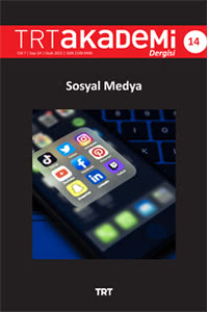Metaverse, Etik, Gelecek ve Kamusal Düzenlemeler
Metaverse, Blokzinciri Teknoljisi, Etik, Dışsallıklar, Kamusal Düzenlemeler
Metaverse Ethics Future and Public Regulations
Metaverse, Ethic, BlockchainTechnology, Externalities, PublicRegalations,
___
- Akman, K. & Övgün, B. (2022). Devletin gölgesinde dijitalleşmenin dönüştürdüğü mahremiyet. Amme İdaresi Dergisi, 55(1), 35-61.
- Armstrong, J. (1997). “Reason and Passon ın Public Sector Reform”, A Discussion Papers Prepared for PSC Learning Series.
- Blockchain Teknolojisi ve Uygulamalar, Ekonomik Faaliyetlerin Dijitalleşmesi ve Metaverse, Atlas Kitabevi, Ankara.
- Blockchain Teknolojisi ve Uygulamalar, Kripto Paraların Vergilendirilme Sorunu ve Vergi Yapılarına Etkileri, Atlas Kitabevi, Ankara.
- Emrem, E. (2022). “Dijital Teknolojilerle Üretilen Metaverse (Öte Evren) Kavramı ve Etik Üzerine Bir Tartışma”, Global Medium Journal, Cilt: 12, Sayı: 24, ss. 263- 285.
- Esen, D. (2020). “Teleolojik ve Deontolojik Kuram Bağlamında İşletmelerin Etik Çalışmalarının Analizi”, Erciyes Üniversitesi İktisadi ve İdari Bilimler Fakültesi Dergisi, Sayı: 1, ss. 296-320.
- Ethical Decision Making in Marketing”, Journal of Marketing, Vol: 49, Issue: 3, pp. 87-96. Ferrell, O.C. & Gresham, L. G. (1985). “A Contingency Framework for Understanding Focus On Marketing Ethic”, Journal of Business Ethics, Issue: 8, pp. 695-743.
- Güven, V. & Şahinöz, E. (2018). Blok Zincir Kripto Paralar Bitcoin, 2.Baskı, Kronik Kitap,
- İstanbul. H. Halpin, M. Piekarska, (2017). “Introduction to Security and Privacy on the Blockchain”, 2017 IEEE European Symposium on Security and Privacy Workshops (EuroS&PW).
- He, Y. vd. (2018). “A Blockchain Based Truthful Incentive Mechanism for Distributed P2P Applications”, IEEE Access, Vol: 6, pp. 27324-27335.
- Karaarslan, E. & Yılmaz, S. Y. (2022). Metaverse Geleceğin Dünyalarını İnşa Edecek Teknolojiler, Fırsatlar ve Tehditler, Bölüm; Metaverse ve Merkeziyetsizlik, Nobel Yayınları, Ankara.
- Kun, Y. U. E. (2022). “The Metaverse in the Psychoanalytic Perspective: The Unleashed Human Id in the Metaverse”, Psychology, Vol: 12, Issue: 1, pp. 6-10.
- Lee, J. Y. (2021). “A Study on Metaverse Hype for Sustainable Growth”, International Journal of Advanced Smart Convergence, 10(3), 72-80.
- Mendi, A. F. & Çabuk, A. (2018). “Bitcoin’in Arkasındaki Güç: Blockchain”, GSI Journals Serie C: Advancements in Information Sciences and Technologies, Cilt: 1, Sayı: 1.
- Nakamoto S. (2008). “Bitcoin: A peer-to-peer electronic cash system”, Decentralized Bu- siness Review, 21260.
- Öztürk, İ., & Zeybek, B. (2021). “Dijitalleşme ve Etik Sorunlar: Nesnelerin İnterneti Teknolojisini Gözetim, Gizlilik, Güvenlik Kapsamında Değerlendirme”, İletişim Kuram ve Araştırma Dergisi, Sayı: 55, ss.1-15.
- Rhue, L. (2018). Trust is All You Need: An Empirical Exploration Of Initial Coin Offerings (ICOs) and ICO Reputation Scores. https://papers.ssrn.com/sol3/papers.cfm?abstract_id=3179723, (24.10.2022).
- Tan, W. vd. (2022). “A Novel Service Level Agreement Model Using Blockchain and Smart Contract for Cloud Manufacturing in Industry 4.0”, Enterprise Information Systems, Vol: 16, Issue: 12, pp. 1939426.
- Tanrıverdi, M. vd. (2019). “Blokzinciri Teknolojisi Nedir? Ne Değildir?: Alanyazın İncelenmesi”, Bilişim Teknolojileri Dergisi, Cilt: 12, Sayı: 3, ss. 203-217.
- Tian F. (2016). “An agri-food supply chain traceability system for China based on RFID & amp; blockchain technology”, 13th International Conference on Service Systems and Service Management (ICSSSM).
- Tsalikis, J. & Fritsche, D. J. (1989). “Business Ethics: A Literatüre Review With A Web_1: Charities Aid Foundation, We Make Giving Count, https://www.cafonline.org/, 07.10.2022. Web_2: https://voatz.com/, 09.10.2022.
- Yıldız, A. (2018). “Ahlaki Rölativizm Eleştirisi”, Bilimname, Sayı: 35, ss. 51-72.
- Yılmaz, F. vd. (2022). “Sağlık Hizmetlerinin Geleceğinde Metaverse Ekosistemi ve Teknolojileri: Uygulamalar, Fırsatlar ve Zorluklar”, Eurasian Journal of Health Technology Assessment, Cilt: 6, Sayı: 1, ss. 1-22.
- Yüksel, M. (2015). “Etik Kodlar, Ahlak ve Hukuk-Hakemli Makale”, Hacettepe Hukuk Fakültesi Dergisi, Cilt: 5, Sayı: 1, ss. 9-26.
- Zuckerberg, M. (2021). Founder’s Letter, 2021.https://about.fb.com/news/2021/10/ founders-letter/, 09.10.2022
- ISSN: 2149-9446
- Yayın Aralığı: 3
- Başlangıç: 2016
- Yayıncı: TRT
Sanal Gerçeklik ve Animasyon Kurgusuna Dair Yeni Bir Perspektif
Evrenden (Universe) Metaevrene (Metaverse) Sosyal Etkileşimin Görselliği Üzerine
Sanal Gerçekliğin Yeni Anakarası: Metaverse
Serdar Kuzey YILDIZ, Gülsün BOZKURT
Toplumsal Yaşamda Metaverse: Metaverse Haberleri Üzerine Bir Değerlendirme
“Don’t Look Up” Filminde Bir Kıyamet Senaryosu Olarak “Post-truth”
Prof Dr. Şükran Güzin Ilıcak AYDINALP
"Dünyanın Yönetim Şekli Artık Algoritmokrasidir"
"Otuz Yıl Önce İnternet Neyse Metaverse de Şu An Odur"
Geleceği Dün ve Şimdi Belirler: İnsan Merkezli Sanal Gerçeklik Tasarımı
Etkinlik Yönetimi Platformu Olarak Metaverse: Metaverse Türkiye E-Dergisi Örneği
